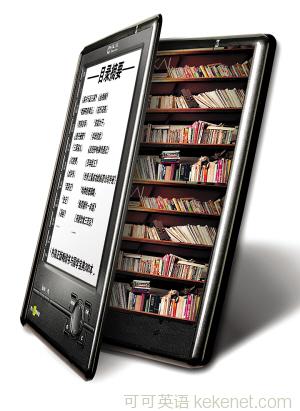
Host: Entertainment is going digital. Music 2)succumbed first and fastest. Movies are now 3)rippable and downloadable to watch anytime, anywhere. And, after much 4)resistance, the 5)stubborn paper book is finally beginning to give itself over to the digital revolution. Last year 5% of the books bought in the US and UK were digital ones, a combination of audio books and e-books. Now that’s obviously small, but it is growing. Now libraries are beginning to offer so-called e-lending, something which started in the US and has made its way across the Atlantic. Now around a quarter of British libraries offer digital book 6)loans.
主持人:娛樂(lè)業(yè)正走向電子化。音樂(lè)是最先也是最快屈服的。如今電影可以在任何時(shí)間任何地點(diǎn)被拷貝和下載來(lái)看。而頑固的紙質(zhì)圖書(shū),在作了長(zhǎng)期的反抗之后,終于開(kāi)始改變自己,參與到了電子圖書(shū)的革命中來(lái)。去年,美國(guó)和英國(guó)售出的圖書(shū)當(dāng)中,有百分之五是電子書(shū),包括有聲書(shū)和電子閱讀器。目前看來(lái)它顯然只占很小的份額,但是卻在增長(zhǎng)中。現(xiàn)在,圖書(shū)館開(kāi)始推出所謂的電子借閱方式,這種方式起源于美國(guó),并且向大西洋沿岸國(guó)家席卷而來(lái)。如今英國(guó)有大約四分之一的圖書(shū)館提供電子書(shū)的借閱服務(wù)。
Fiona Marriott (Luton Library): We’ve noticed that, with e-books, we’re getting a new kind of customer in: people who felt that they were too busy to use the library before, or, for example, people who commuted into London every day who were too busy to come in in the evening or too tired, and I have at least two blind customers who are downloading their own audio books now. And they say that’s given them freedom, so that they can actually make their own choice without having to come to the library with a guide.
菲奧納·馬里奧特(盧頓圖書(shū)館):我們注意到,有了電子書(shū)后,我們獲得了一個(gè)新的用戶群:以前總感覺(jué)太忙而沒(méi)法使用圖書(shū)館的人們,或者比如說(shuō),曾經(jīng)每天通勤于倫敦市,忙到晚上不能來(lái)圖書(shū)館又或者太疲憊的人們。而我至少有兩位失明的用戶現(xiàn)在正在下載他們自己的有聲書(shū)。他們說(shuō)這種方式給了他們自由,因此他們可以實(shí)實(shí)在在地做他們自己的決定而不必非得和向?qū)б黄饋?lái)圖書(shū)館。
Host: Overdrive is the digital book 8)distributor used by 13,000 libraries worldwide. You can log on to your library through a web browser or using the 9)Smartphone 10)App, and then browse an on-line collection of books. When you see something you like, just click to download it. E-lending means your library is open 11)24/7. No money is spent on staff to issue books or return them to shelves, there are no damaged or lost copies, and there are no late returns.
主持人:Overdrive是全球一萬(wàn)三千座圖書(shū)館使用的電子閱讀器經(jīng)銷商。你可以通過(guò)網(wǎng)絡(luò)瀏覽器或者使用智能手機(jī)應(yīng)用程序登錄你的圖書(shū)館,然后瀏覽在線藏書(shū)。當(dāng)你看到你喜歡的書(shū)時(shí),只要點(diǎn)擊下載就行了。電子借閱方式意味著你的圖書(shū)館是全年無(wú)休的。不用雇傭人員來(lái)發(fā)放書(shū)籍或者將其放回書(shū)架,不會(huì)有書(shū)籍損壞或者丟失,也不會(huì)有遲還的現(xiàn)象發(fā)生。
But surely there’s a bit of a logic problem with libraries loaning e-books. After all, if you want an e-book, you don’t physically have to go anywhere to get it. And you’re also not limited by how much stock there is. There’s always an 12)infinite number of copies of any text that you want to download. And that sounds much more convenient than having to pop down to your local library only to find that the one copy of the book they have is already out.
不過(guò)圖書(shū)館借出電子書(shū)的服務(wù)無(wú)疑還存在一點(diǎn)邏輯問(wèn)題。畢竟如果你是想要一本電子書(shū)的話,你不用親自去某個(gè)地方獲取。你也不用受限于該書(shū)的庫(kù)存量,你想要下載的任何內(nèi)容都總會(huì)有無(wú)窮本在那里。比起你非得去一趟當(dāng)?shù)貓D書(shū)館卻發(fā)現(xiàn)他們所擁有的唯一一本已經(jīng)借出去了,這種方式聽(tīng)起來(lái)要便利很多。
The first point doesn’t help the argument of those hoping to keep libraries open in this time of government spending cuts. If libraries did all their lending over the web, well, you wouldn’t need a physical library at all. And the second point about limitless copies for loan could mean that no one would ever need to actually buy a book at all. And that’s, understandably, worrying the book publishers.
在這個(gè)政府削減支出的時(shí)候,第一點(diǎn)(采用電子借閱方式)對(duì)那些希望讓圖書(shū)館保持開(kāi)放的人的觀點(diǎn)毫無(wú)益處。如果圖書(shū)館全部采用網(wǎng)上借閱方式,那么,你將根本不需要一個(gè)實(shí)體圖書(shū)館。而第二點(diǎn),關(guān)于不限制借出書(shū)的本數(shù)可能意味著沒(méi)有人會(huì)真的去買一本書(shū)。那么理所當(dāng)然地,這是讓圖書(shū)出版者們擔(dān)憂的問(wèn)題。
Richard Mollet (Publisher’s Association UK): This relationship between publishing and libraries is historic, over a hundred years old, and we want it to continue into the e-book future. But we have to ensure that we 13)replicate, as closely as we can, the success of the physical lending model, which is that there’s one book, there’s one user, there’s one time, and in that way you ensure that the lending model doesn’t start to impact upon the retail model.
理查德·莫雷特(英國(guó)出版者協(xié)會(huì)):這種出版業(yè)和圖書(shū)館之間的關(guān)系是歷史性的,有一百年多年之久,而我們想要這種關(guān)系持續(xù)到未來(lái)的電子書(shū)時(shí)代。但是我們必須確保我們盡可能精密地模擬實(shí)體借閱模式的成功方式,那就是一位用戶在一個(gè)時(shí)間內(nèi)借一本書(shū),那樣你才可以確保這種借閱模式不會(huì)影響到零售模式。
Host: Overdrive attempts to 14)allay those concerns. A local library chooses how many digital copies to purchase and that limits the number of users who can borrow the e-book at one time. When the loan period is up, the book will 15)expire automatically and return itself to the e-library for other 16)patrons to enjoy.
主持人:Overdrive一直試圖消除這些擔(dān)心。一座本地圖書(shū)館決定了多少本電子版是需要購(gòu)買的,這就限制了本來(lái)曾經(jīng)可以通過(guò)電子借閱方式閱讀該書(shū)的用戶數(shù)量。當(dāng)借書(shū)期限一到,此書(shū)將自動(dòng)終止借閱服務(wù),并自動(dòng)還回電子圖書(shū)館以供其他用戶借閱。
Some libraries use this system: “public library on line”. Here, all reading is done through a web browser; no book is downloaded. You don’t need to worry about the availability of a title either. All books can be accessed by many users at one time. The downside is, if your internet connection disappears, so does your book. Also, reading books on a web browser isn’t easy on the eyes, and most e-readers don’t come with a browser. This is essentially an attempt to tempt the reader into buying the physical book.
一些圖書(shū)館采用“在線公共圖書(shū)館”這種系統(tǒng),在這里,所有的閱讀都通過(guò)網(wǎng)絡(luò)瀏覽器來(lái)完成,沒(méi)有書(shū)是下載來(lái)看的。你也不用擔(dān)心書(shū)目的可用性,所有書(shū)都可以被多名用戶同時(shí)讀到。(這種方式的)缺點(diǎn)是,如果你的網(wǎng)絡(luò)連接不見(jiàn)了,(你要看的)書(shū)也就不見(jiàn)了。還有,在網(wǎng)絡(luò)瀏覽器上閱讀很費(fèi)眼,而大多數(shù)電子閱讀器又不會(huì)同時(shí)提供一個(gè)瀏覽器,這從根本上就吸引了讀者去購(gòu)買紙質(zhì)書(shū)。
But the Publishing Association goes one step further still, suggesting that library customers should have to physically visit the library to download an e-book.
但是出版者協(xié)會(huì)還是超前一步,建議圖書(shū)館用戶應(yīng)該親自去圖書(shū)館下載一本電子書(shū)。
Richard: There need be no difference between doing that in the physical world, where you walk out with a physical book under your arm, or in the digital world where you walk out with an e-reader under your arm, which has a book you just downloaded. So, to my mind, if we can at least get that right, get that duplication right, that’s the first step.
理查德:無(wú)論是你在現(xiàn)實(shí)社會(huì)中在胳膊底下夾本書(shū)走出去,或是在電子世界里,胳膊底下放個(gè)存有你剛下載的書(shū)的電子閱讀器走出去,都沒(méi)有什么不同。所以,依我之見(jiàn),如果我們能夠至少獲得那種權(quán)利,獲得那種復(fù)制權(quán),那就邁出了第一步。
Host: But even then, not all are convinced. At the start of the year, one of the biggest publishers in the world, McMillan Publishing US, declared it had no interest in being on libraries’ 17)virtual shelves.
主持人:但是盡管那樣,也不是所有人都信服此觀點(diǎn)。今年年初,世界上最大的出版商之一——美國(guó)麥克米蘭出版公司,宣布其對(duì)登上圖書(shū)館的虛擬書(shū)架毫無(wú)興趣。
Some libraries are sticking to physical books but with a digital twist. Members of the New York Public Library can reserve a book through its website or, alternatively, click through to buy it from an on-line retailer, and the library gets a cut. Of course this doesn’t help the smaller libraries to remain open in times of huge budget cuts. And if more libraries do end up closing, this could be the way we borrow physical books in the future.
一些圖書(shū)館一直堅(jiān)持要用紙質(zhì)書(shū),不過(guò)可以捆綁數(shù)碼產(chǎn)品。紐約公共圖書(shū)館的會(huì)員可以通過(guò)其網(wǎng)站收藏一本書(shū),或者只有點(diǎn)擊進(jìn)入網(wǎng)站從在線零售商那里購(gòu)買此書(shū),而圖書(shū)館可以從中提成。當(dāng)然這并不能幫助小型圖書(shū)館在巨額預(yù)算被削減的時(shí)期保持開(kāi)放,而且如果更多的圖書(shū)館真能因此改變閉館的命運(yùn),這將是我們今后借閱紙質(zhì)書(shū)的一種方法。












